Camping under the stars can be one of the most exhilarating experiences for everyone but let’s face it—nature calls, and sometimes, it’s not the most convenient moment. If you’ve ever found yourself struggling with nighttime bathroom breaks or wondering about the best ways to handle your pee needs in the great outdoors, you’re not alone. In this guide, we’ll explore everything about how to pee while camping. from practical tips for staying comfortable to creative solutions for those middle-of-the-night urgencies. Get ready to tackle your camping pee problems with confidence and keep your outdoor adventures hassle-free!
Table of Contents
How to Pee while camping?
First, of all to pee comfortably, you have to pick a good spot, there are three main things that confirm a good spot.
Privacy
The first thing for a good peeing spot is privacy, you’re going to need 365°of privacy as you have to pull your pants all the way down.
Safe Place
Secondly, you have to make sure there aren’t any harmful plants, ant hills, or any other animal holes.
Level ground
The important thing to ensure you’re comfortable is to ensure the ground is stable and not too steep or slippery. So, you don’t have to worry about falling!
Use the Right Technique
Using the right techniques is key to maintaining hygiene and always staying clean.
Pull your pants down to your knees
You mustn’t go all the way down to your ankles or up too high otherwise you will pee on your pants.
Pull your pants just like this down to the top of your knees.
Squat all the way down
Make sure you get all the way down in this relaxed position with the backs of your legs resting on your calves.
If you are in kind of a partial squat you might end up peeing down your leg so relax all the way down in that position.
If you are a woman then I recommend you always bring an apparatus with you like a pee funnel because it can make the process easier and more convenient. Practice using it at home first to get comfortable with it.
Don’t mess with Wind
Pay attention to the wind direction. If you don’t want any unexpected urine drops coming back at you!
If it’s windy outside, try to find a sheltered spot where the wind is less strong so you don’t have to suffer from any worst scenario.
Pack in & Pack it out
If you bring toilet paper to use make sure that you take your used toilet paper out with you and don’t bury it in the ground.
You can also use a small pack of biodegradable wipes for hygiene but remember to pack those out too.
There’s nothing that makes me sadder than getting to some pretty destinations and seeing somebody’s toilet paper in the bushes.
Respect Nature
Don’t forget to Follow Leave No Trace principles by minimizing your impact on the environment.
Encourage others in your group to do the same, creating a cleaner and more pleasant experience for everyone.
What can I use to pee when camping?
When you’re out in the wilderness, peeing isn’t as simple as it is at home. But with the right tools and a bit of preparation, it can be a straightforward and comfortable process.
One of the most common methods is to find a secluded spot and squat simply. This is often the easiest option for many campers because it requires no additional equipment. When choosing a peeing spot it is best to pee around 200 feet or 70 big steps away from trails, campgrounds, climbing routes, and other high-traffic areas. Look for stable ground to avoid slips and be mindful of plants like poison ivy.
Pee Funnel (Female Urination Device)
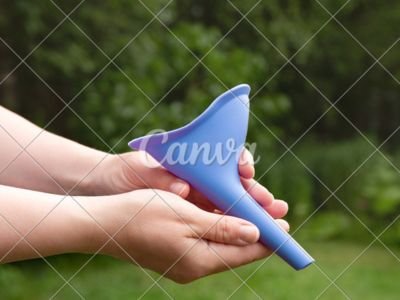
For women, a portable female urination device (FUD) can be a game-changer. These devices, often called pee funnels, allow you to urinate standing up, which can be more convenient and hygienic, especially in cold or wet weather. Pee funnels are typically made from silicone or plastic and are designed to be easy to use and clean. Before heading out, practice using it at home to get comfortable with the technique.
Portable Toilets

Another handy option is a portable toilet or pee bottle. Portable toilets are compact and designed for camping, offering a more traditional toilet experience. They come in various styles, from simple bucket designs to more sophisticated folding models with waste bags. A pee bottle can be particularly useful for nighttime use when you don’t want to leave the tent. Just make sure to label it clearly to avoid any mishaps!
Natural Materials
For those who prefer a more natural approach, nature itself offers some solutions. Smooth stones, large leaves, or even snow can be used for cleaning up after peeing. Just be cautious and ensure the materials are safe and non-toxic. For instance, avoid using unfamiliar plants that might cause irritation.
Regardless of the method you choose, maintaining hygiene is crucial. Always carry hand sanitizer and use it after peeing to keep your hands clean. If you use toilet paper or wipes, pack them out in a sealed plastic bag to dispose of properly later. Following Leave No Trace principles ensures you leave the environment as pristine as you found it.
Why do I pee so much at night camping?
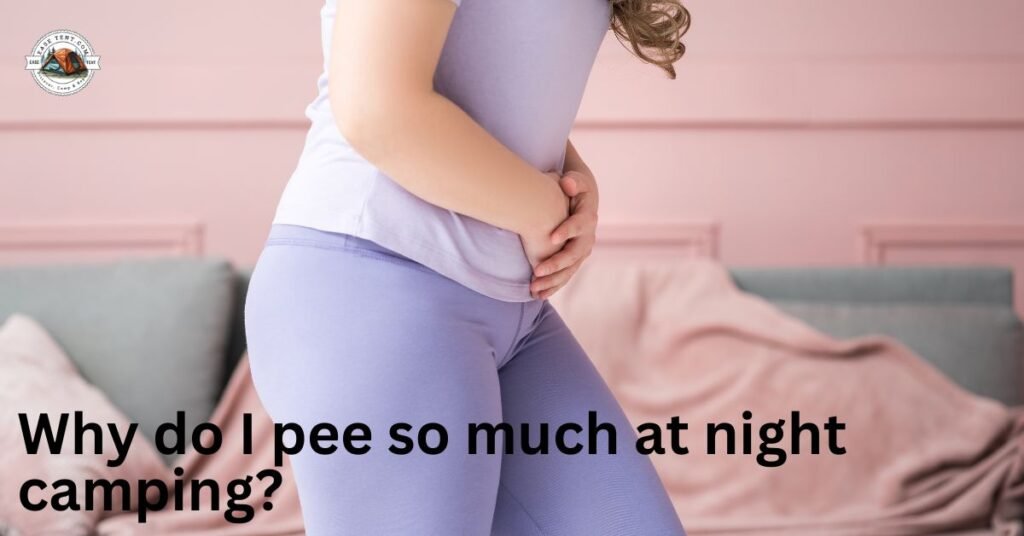
If you’re waking up to pee more than twice a night that can be called nocturia and it will be annoying for many people because they don’t want to go in the bathroom again and again.
Let’s understand why it happens.
Hydration Habits
When camping, you may drink more water than usual to stay hydrated, especially if you’re hiking or engaging in other strenuous activities during the day. While staying hydrated is crucial, consuming large amounts of water close to bedtime can lead to increased nighttime urination. To manage this, try to drink most of your water earlier in the day and limit your intake in the hours leading up to bedtime.
Cold Temperatures
Cold weather can cause your body to produce more urine. This phenomenon is known as cold diuresis and it occurs because your body works to maintain its core temperature by constricting blood vessels, which increases blood pressure and prompts your kidneys to filter out excess fluid. If you’re camping in a chilly environment, this natural response can lead to more frequent trips to pee during the night. Using a warm sleeping bag and wearing layers can help keep you warm and potentially reduce the need to pee.
Changes in Routine
Camping often means a break from your regular routine, including different meal times, varying activity levels, and altered sleep patterns. These changes can impact your body’s natural rhythms, including your urinary habits. Additionally, the excitement or anxiety of being in a new environment might make you more aware of your bodily functions, prompting more frequent bathroom visits.
Diet and Caffeine
What you eat and drink can also influence how often you need to pee. Consuming foods with high water content, such as fruits and vegetables, or drinking caffeinated beverages like coffee or tea can increase urine production. Caffeine is a diuretic, which means it makes you pee more frequently. Being mindful of your diet and caffeine intake, especially in the evening, can help reduce nighttime trips to the bathroom.
Natural Anxiety and Alertness
The unfamiliar sounds and sensations of the outdoors can heighten your alertness, making you more sensitive to the need to pee. The lack of familiar surroundings and the potential for wildlife encounters can create low-level anxiety, keeping you more awake and aware of your bladder. Practicing relaxation techniques before bed, such as deep breathing or meditation, can help ease this anxiety and reduce the frequency of nighttime urination
How to sleep through the night without waking up to pee?
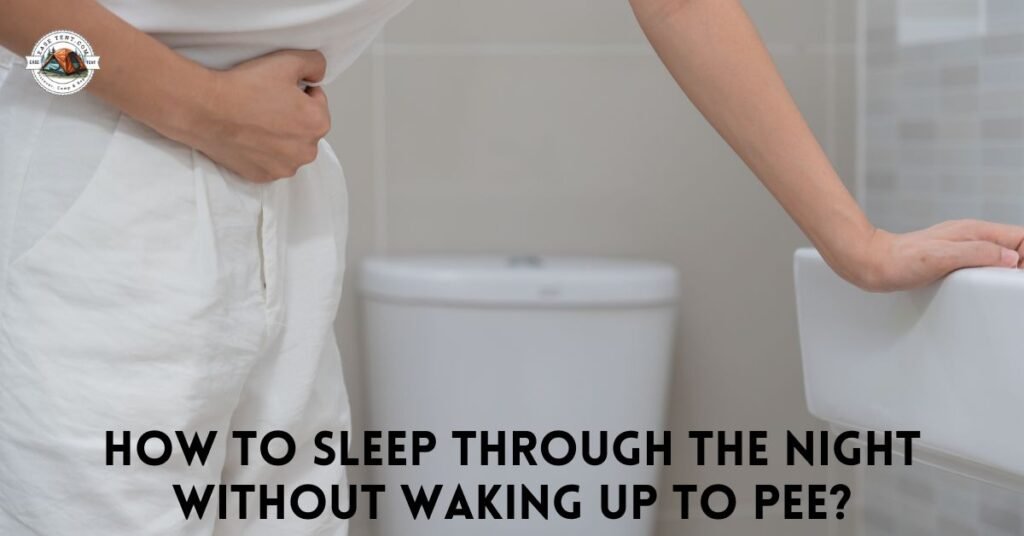
Waking up to pee during the night can disrupt your sleep and make your camping experience less enjoyable. Here are some strategies to help you sleep through the night without needing to get up to pee and the best ways to reduce Night Peeing Naturally.
Manage Your Fluid Intake
One of the most effective ways to reduce nighttime trips to the bathroom is to manage your fluid intake. Drink plenty of water throughout the day to stay hydrated but start tapering off your intake in the late afternoon and evening. Aim to stop drinking fluids at least two hours before bedtime. This gives your body time to process the fluids and reduces the likelihood of needing to pee during the night.
Limit Diuretics
Avoid consuming diuretics, such as caffeine and alcohol, in the evening. These substances can increase urine production and make you more likely to wake up needing to pee. Opt for non-caffeinated, non-alcoholic beverages in the hours leading up to bedtime.
Empty Your Bladder Before Bed
Make a habit of going to the bathroom right before you go to bed, even if you don’t feel a strong urge to pee. This can help ensure your bladder is as empty as possible, reducing the chances of waking up during the night.
Stay Warm
Cold temperatures can trigger cold diuresis, where your body produces more urine in an effort to maintain its core temperature. To counter this, make sure you stay warm at night by using a good-quality sleeping bag, wearing thermal clothing, and adding extra blankets if necessary. Staying warm can help reduce the need to pee.
Elevate Your Legs
About an hour before you go to bed, try elevating your legs. This helps redistribute and reduce fluid buildup in your legs, which can be excreted before you sleep instead of during the night. Lie down and prop your legs up on a pillow or against a wall for about 15-20 minutes.
Exercise and Physical Activity
Regular physical activity can help improve your overall fluid balance and reduce the need to pee at night. During your camping trip, stay active by hiking, walking, or engaging in other outdoor activities. However, try to avoid vigorous exercise right before bedtime, as it can make it harder to fall asleep.
Diet Considerations
Certain foods can act as diuretics or irritate the bladder, making you more likely to wake up to pee. Avoid foods that are high in sugar, spicy, or acidic in the evening. Instead, opt for a balanced dinner with a good mix of protein, healthy fats, and complex carbohydrates.
Bladder Training
Training your bladder can help increase its capacity over time. Gradually extend the time between bathroom visits during the day, which can help reduce the frequency of nighttime urination. However, be careful not to overdo it and cause discomfort or other urinary issues.
Consult a Doctor
If you find that you frequently wake up to pee despite trying these strategies, it might be worth consulting a doctor. Conditions like nocturia (excessive nighttime urination), overactive bladder, or other medical issues could be contributing to your frequent nighttime trips to the bathroom. A healthcare professional can provide personalized advice and treatment options.
What happens if you hold your pee overnight?
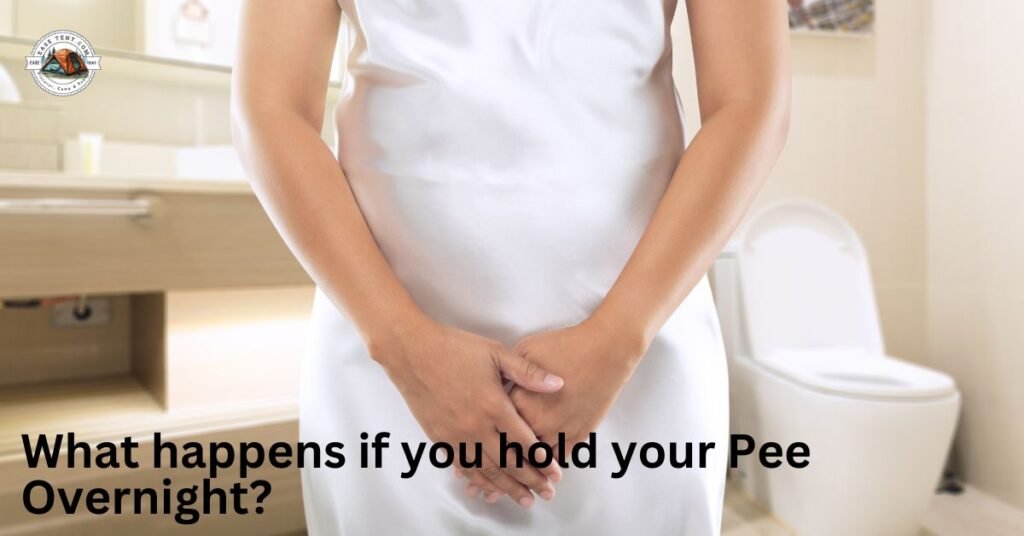
Holding your pee overnight might seem like a convenient option, especially if you’re camping and don’t want to leave the comfort of your sleeping bag. However, doing this regularly can have several effects on your body and overall health.
Discomfort and Pain
One of the most immediate consequences of holding your pee for too long is discomfort and pain. As your bladder fills up, it stretches to accommodate the increasing volume of urine. This can create a pressing, uncomfortable sensation in your lower abdomen. In some cases, the discomfort can turn into pain, making it difficult to sleep or relax.
Interrupted Sleep
Even if you manage to fall asleep while needing to pee, the discomfort can cause you to wake up frequently during the night. This leads to interrupted sleep and can result in feeling tired and groggy the next day. Poor sleep quality can affect your mood, cognitive function, and overall well-being.
Increased Risk of Urinary Tract Infections (UTIs)
Holding your pee for extended periods can increase your risk of developing urinary tract infections. Urine is a waste product that contains bacteria and toxins your body needs to expel. When urine stays in the bladder for too long, it provides an environment for bacteria to multiply, potentially leading to an infection. Symptoms of a UTI include a burning sensation when urinating, frequent urination, and cloudy or foul-smelling urine.
Bladder Damage
While occasional holding of urine is unlikely to cause significant harm, regularly doing so can weaken the bladder muscles over time. This weakening can lead to bladder dysfunction, making it difficult to empty your bladder completely. In severe cases, chronic retention of urine can cause the bladder to stretch excessively, potentially leading to permanent damage.
Kidney Problems
In rare and severe cases, holding your pee for too long can cause urine to back up into the kidneys, leading to kidney damage or infections. The kidneys play a crucial role in filtering waste from your blood and producing urine. When urine flow is obstructed, it can increase pressure in the kidneys, potentially causing harm.
Incontinence Issues
Frequent and prolonged holding of urine can also lead to incontinence issues. Over time, the bladder muscles may become overactive or weakened, resulting in involuntary leakage of urine. This can be particularly troublesome and embarrassing, affecting your quality of life and daily activities.
FAQs
Is it normal to pee your pants while sleeping?
Peeing your pants while sleeping, known as nocturnal enuresis, is more common in children but can occasionally occur in adults due to factors like stress, medical conditions, or bladder issues. If it happens frequently, it’s a good idea to consult a healthcare professional for advice.
Do hammocks make you pee?
Hammocks themselves don’t make you pee more, but their gentle rocking motion can sometimes stimulate the need to urinate. Additionally, being in a relaxed position for a long time might make you more aware of your bladder, leading to more frequent bathroom trips.
Conclusion
Navigating the call of nature while camping doesn’t have to be daunting. With the right preparation and a few handy tips, you can handle nighttime bathroom needs smoothly and keep your camping experience enjoyable. Remember to manage your hydration wisely, use the tools and techniques that work best for you, and always respect the environment by following Leave No Trace principles. By mastering these simple strategies, you’ll be able to focus on the beauty and adventure of the great outdoors without any unnecessary interruptions. So, pack your gear, head out into nature, and embrace your camping trips with newfound confidence and comfort!
You May Also Like
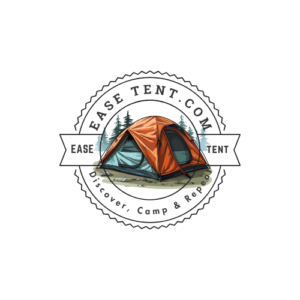
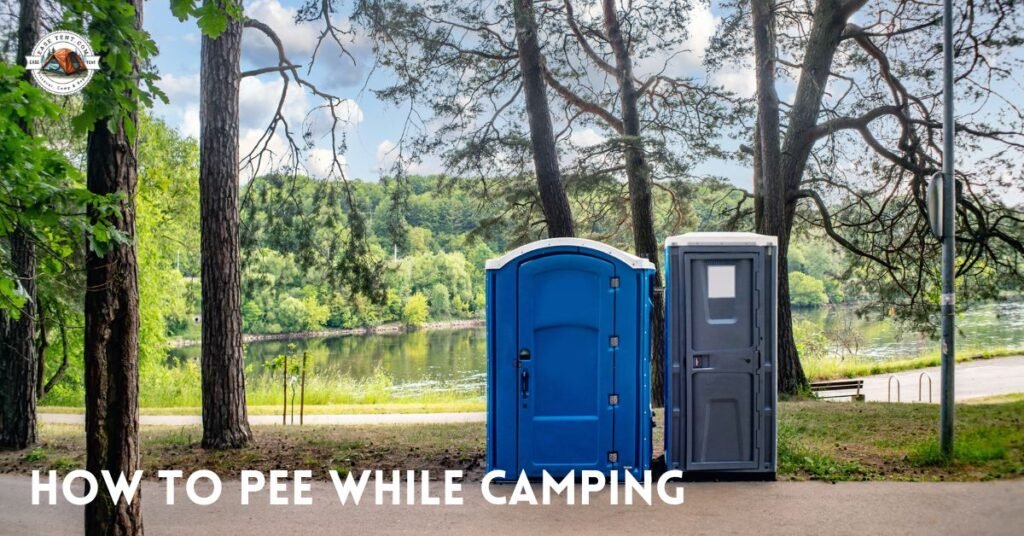
thanks saif for sharing this information with us, i love to read and please write an blog also on how we will manage the food and water in more then 1 weak of camping
Pingback: How to avoid a yeast infection while camping? Camping